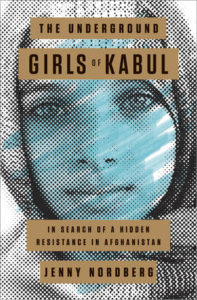
Photo Credit: Goodreads.com
The Underground Girls of Kabul by Swedish journalist Jenny Nordberg is a brilliant and heartbreaking book, and I really loved it a lot. Books by (investigative etc.) journalists are some of my favorite to read (see also: Lynsey Addario’s It’s What I Do.) I ran through the full spectrum of emotions with this book. It made me angry, it made me reflect on my own life, and it made me unbelievably sad. I also was heartened by some of the girls and women profiled, who were so strong willed and knew exactly what they wanted and deserved, despite growing up in one of, if not the strictest societies and cultures for any female. I admired their courage and steadfastness, against society and and against their own family members who would judge them on their life and urge them to be a good girl and get married because only then, would they be complete and so on.
This was a fascinating, complex and layered read of the history and culture of Afghanistan. I finished the book with a sense of hope, for the women of Afghanistan and all around the world. Because, there is no mistaking it, things currently are….not great, to say the least, for 99.9% of women in Afghanistan — but the author had some interesting things to say about gender, society and the patriarchal structure in Afghanistan and those were my favorite parts of the book.
One of my favorite quotes is on page 44: “But the patriarchal system, with the idea that women should be subordinate to men, and that sons are more valuable than daughters, was never in fact a “natural” nor a God-given order that always existed. It can be traced back to entirely human-created historical events.” The author argues a bit that much like how slavery (in the majority of the world, anyway) has ended, the patriarchy will meet its end someday. I also appreciated her argument that to bring men into discussions about equality (ex. showing them that having honor means not inflicting violence on your spouse) would only elevate women in the long run and make it easier for other men to join the movement for equality.
Overall I loved this book and I definitely want to read it again — I think I would get more out of it the next time, because I’m sure I’ve missed some things. But I loved the mix between the profile/narrative bits and the context, and thought for the most part the book was structured well. There weren’t many parts where I felt the structure was off, and if I did think that, it was only because I got sucked into one particular woman’s story and didn’t want to have to start reading about someone else. This book is one of the most important books I have read in 2018, and I would strongly recommend it to anyone and everyone. Enjoy!
-Sage Daugherty
Associate Editor
Girl Museum Inc.
